Homeostatic imbalance - Study guides, Class notes & Summaries
Looking for the best study guides, study notes and summaries about Homeostatic imbalance? On this page you'll find 472 study documents about Homeostatic imbalance.
Page 3 out of 472 results
Sort by
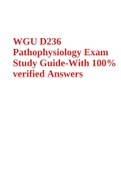
-
WGU D236 Pathophysiology Exam Study Guide-With 100% verified Answers
- Exam (elaborations) • 29 pages • 2023
-
Available in package deal
-
- $13.49
- 1x sold
- + learn more
WGU D236 Pathophysiology Exam Study Guide-With 100% verified Answers. How does the RAAS (Renin-Angiotensin-Aldosterone System) result in increased blood volume and increased blood pressure? A drop in blood pressure is sensed by the kidneys by low perfusion, which in turn begins to secrete renin. Renin then triggers the liver to produce angiotensinogen, which is converted to Angiotensin I in the lungs and then angiotensin II by the enzyme Angiotensin-converting enzyme (ACE). Angiotensin II ...
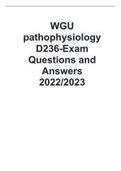
-
WGU pathophysiology D236-Exam Questions and Answers 2022-2023
- Exam (elaborations) • 43 pages • 2022
-
- $15.99
- 5x sold
- + learn more
WGU pathophysiology D236-Exam Questions and Answers 2022/2023 What is Starling's Law of Capillary forces? How does this explain why a nutritionally deficient child would have edema? - ANSWER Starling's Law describes how fluids move across the capillary membrane. There are two major opposing forces that act to balance each other, hydrostatic pressure (pushing water out of the capillaries) and osmotic pressure (including oncontic pressure, which pushes fluid into the capillaries). Bot...
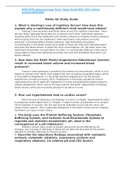
-
WGU D236 pathophysiology Exam -Study Guide-With 100% verified answers-2022-2023
- Exam (elaborations) • 26 pages • 2022
-
- $9.79
- 4x sold
- + learn more
1. What is Starling's Law of Capillary forces? How does this explain why a nutritionally deficient child would have edema? Starling’s Law describes how fluids move across the capillary membrane. There are two major opposing forces that act to balance each other, hydrostatic pressure (pushing water out of the capillaries) and osmotic pressure (including oncontic pressure, which pushes fluid into the capillaries). Both electrolytes and proteins (oncontic pressure) in the blood affect osmot...
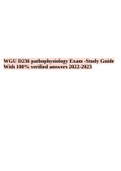
-
WGU D236 pathophysiology OA Exam -Study Guide With 100% verified answers 2022-2023.
- Exam (elaborations) • 28 pages • 2023
- Available in package deal
-
- $10.99
- 1x sold
- + learn more
WGU D236 pathophysiology OA Exam -Study Guide With 100% verified answers 2022-2023. Patho OA Study Guide 1. What is Starling's Law of Capillary forces? How does this explain why a nutritionally deficient child would have edema? Starling’s Law describes how fluids move across the capillary membrane. There are two major opposing forces that act to balance each other, hydrostatic pressure (pushing water out of the capillaries) and osmotic pressure (including oncontic pressure, which p...
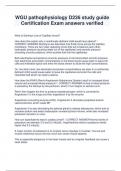
-
WGU pathophysiology D236 study guide Certification Exam answers verified
- Exam (elaborations) • 33 pages • 2024
-
Available in package deal
-
- $17.99
- + learn more
WGU pathophysiology D236 study guide Certification Exam answers verified What is Starling's Law of Capillary forces? How does this explain why a nutritionally deficient child would have edema? - CORRECT ANSWER-Starling's Law describes how fluids move across the capillary membrane. There are two major opposing forces that act to balance each other, hydrostatic pressure (pushing water out of the capillaries) and osmotic pressure (including oncontic pressure, which pushes fluid into th...
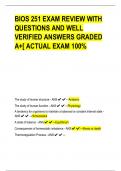
-
BIOS 251 EXAM REVIEW WITH QUESTIONS AND WELL VERIFIED ANSWERS GRADED A+[ ACTUAL EXAM 100%
- Exam (elaborations) • 6 pages • 2024
-
- $17.99
- + learn more
BIOS 251 EXAM REVIEW WITH QUESTIONS AND WELL VERIFIED ANSWERS GRADED A+[ ACTUAL EXAM 100% The study of human structure - ANS---Anatomy The study of human function - ANS---Physiology A tendency for organisms to maintain a balanced or constant internal state - ANS---Homeostasis A state of balance - ANS---Equilibrium Consequences of homeostatic imbalance - ANS---Illness or death Thermoregulation Process - ANS---
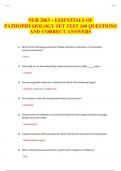
-
NUR 2063 – ESSENTIALS OF PATHOPHYSIOLOGY SET TEST 160 QUESTIONS AND CORRECT ANSWERS
- Exam (elaborations) • 23 pages • 2024
-
- $11.99
- + learn more
NUR 2063 – ESSENTIALS OF PATHOPHYSIOLOGY SET TEST 160 QUESTIONS AND CORRECT ANSWERS 1. Which of the following assessment findingsindicates an alteration in homeostatic control mechanisms? - Fever 2. Injury that occurs when blood flow is diminished to tissue is called injury. - ischemic 3. The cancer growth continuum is divided into which of the following stages? - Initiation, promotion, progression 4. The activities of the cell are directed by which cellstructure? - Cytoplasm 5. ...
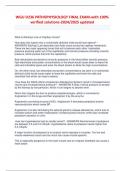
-
WGU D236 PATHOPHYSIOLOGY FINAL EXAM-with 100% verified solutions-2024/2025 updated
- Exam (elaborations) • 32 pages • 2024
- Available in package deal
-
- $15.49
- + learn more
WGU D236 PATHOPHYSIOLOGY FINAL EXAM-with 100% verified solutions-2024/2025 updated What is Starling's Law of Capillary forces? How does this explain why a nutritionally deficient child would have edema? - ANSWERS Starling's Law describes how fluids move across the capillary membrane. There are two major opposing forces that act to balance each other, hydrostatic pressure (pushing water out of the capillaries) and osmotic pressure (including oncontic pressure, which pushes fluid int...
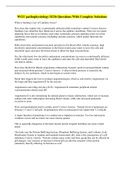
-
WGU pathophysiology D236 Questions With Complete Solutions
- Exam (elaborations) • 31 pages • 2022
-
Available in package deal
-
- $12.49
- 1x sold
- + learn more
What is Starling's Law of Capillary forces? How does this explain why a nutritionally deficient child would have edema? Correct Answer: Starling's Law describes how fluids move across the capillary membrane. There are two major opposing forces that act to balance each other, hydrostatic pressure (pushing water out of the capillaries) and osmotic pressure (including oncontic pressure, which pushes fluid into the capillaries). Both electrolytes and proteins (oncontic pressure) in the bl...
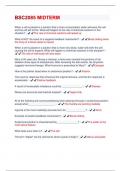
-
BSC2085 MIDTERM QUESTIONS & ANSWERS SCORED A+
- Exam (elaborations) • 16 pages • 2024
- Available in package deal
-
- $8.39
- + learn more
When a cell is placed in a solution that is more concentrated, water will leave the cell and the cell will shrink. What will happen to the rate of chemical reactions in this situation? - ️️The rate of chemical reactions will speed up What is NOT the result of a negative feedback mechanism? - ️️Blood clotting when the lining of a blood vessel is injured When a cell is placed in a solution that is more very dilute, water will enter the cell causing the cell to expand. What will happe...

How did he do that? By selling his study resources on Stuvia. Try it yourself! Discover all about earning on Stuvia


